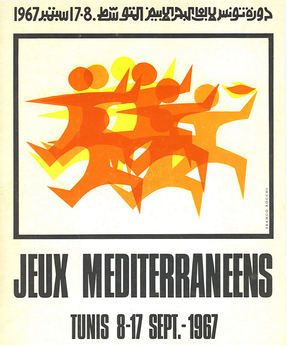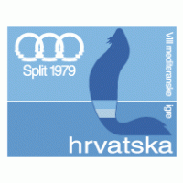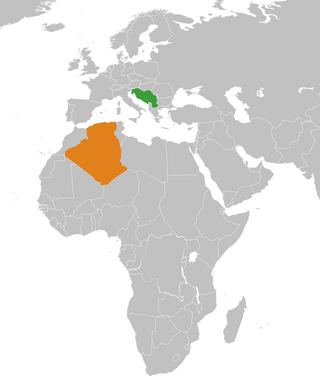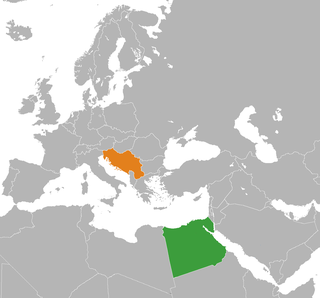
The Mediterranean Games is a multi-sport event organised by the International Committee of Mediterranean Games (CIJM). It is held every four years among athletes from countries bordering the Mediterranean Sea in Africa, Asia and Europe. The first Mediterranean Games were held in 1951 in Alexandria, Egypt, while the most recent games were held in 2022 in Oran, Algeria.
Boro Primorac is a Bosnian professional football manager and former player who most recently managed Croatian First Football League club Hajduk Split.

The 1967 Mediterranean Games, officially known as the V Mediterranean Games, and commonly known as Tunis 1967, were the 5th Mediterranean Games. The Games were held in Tunis, Tunisia over 9 days, from 8 to 17 September 1967, where 1,249 athletes from 11 countries participated. For the first time, women took part in the games. There were a total of 93 medal events from 14 different sports.

The 1979 Mediterranean Games, officially known as the VIII Mediterranean Games, and commonly known as Split 1979, were the 8th Mediterranean Games. The Games were held in Split, Yugoslavia, from 15 to 29 September 1979, where 2,408 athletes from 14 countries participated. There were a total of 192 medal events from 26 different sports.
Basketball at the Mediterranean Games has been played consistently since 1951 for men, and 1987 for women. The Yugoslavia national team was the most successful men's team, while the Croatia women's national team being the most successful in the women's competition. Since 2018, the Mediterranean Games has exclusively featured 3x3 basketball.
Football has been played consistently at the Mediterranean Games since the year 1951 for men. Italy and Spain is the most successful team. From 1991, national teams are not allowed, which means only youth teams participate in the tournament.

Handball has been played consistently at the Mediterranean Games since the year 1967 for men except in 1971 and since the year 1979 for women except 1983. The Yugoslavian national handball team is the most successful men's team and the French women's national handball team is the most successful team for women.

Petar Skansi was a Croatian professional basketball player and coach. During his playing career, he played for Jugoplastika and Maxmobili Pesaro. He was named one of FIBA's 50 Greatest Players in 1991. He was a member of the Yugoslavia national team that silver medalled at the 1968 Summer Olympics.
In the 1967 Mediterranean Games, one of the games played was volleyball. Yugoslavia won the men's division.
The handball tournament at the 1967 Mediterranean Games was held in Tunis, Tunisia.
Tomislav Šuker is a Croatian retired track and field athlete who competed for Yugoslavia. He won a gold medal in shot put at the 1967 Mediterranean Games.

The Socialist Federal Republic of Yugoslavia participated at ten Mediterranean Games from 1951 to 1991, with the exception of 1955. Yugoslavia was the host of the Mediterranean Games in 1979 in Split, when it finished first on the medal podium.
Ratomir "Rato" Tvrdić was a Croatian professional basketball player.

Athletics at the 1979 Mediterranean Games were held in Split, Yugoslavia.
Nemanja Đurić, is a Serbian former professional basketball player and former coach. He represented the Yugoslavia national basketball team internationally.

Vlado Stenzel is a Croatian former handball goalkeeper and coach.
Sreten Dragojlović was a Serbian basketball player and coach. He represented the Yugoslavia national basketball team internationally.
Slobodan "Rica" Gordić is a Serbian former professional basketball player. He represented the Yugoslavia national basketball team internationally.

Algeria–Yugoslavia relations were historical foreign relations between Algeria and now split-up Socialist Federal Republic of Yugoslavia. Both countries self-identified with the wider Mediterranean region and shared membership in the Non-Aligned Movement. During the Algerian War Yugoslavia provided significant logistical and diplomatic support to the Algerian side which affected its intra-European relations with France. Yugoslavia was the first European country to openly support the FLN.

Egypt–Yugoslavia relations were historical foreign relations between Egypt and now break-up Yugoslavia. Both countries were founding members and prominent participants of the Non-Aligned Movement. While initially marginal, relations between the two Mediterranean countries developed significantly in the aftermath of the Soviet-Yugoslav split of 1948 and the Egyptian revolution of 1952. Belgrade hosted the Non-Aligned movement's first conference for which preparatory meeting took place in Cairo, while Cairo hosted the second conference. While critical of certain aspects of the Camp David Accords Yugoslavia remained major advocate for Egyptian realist approach within the movement, and strongly opposed harsh criticism of Cairo or proposals which questioned country's place within the movement.
This page is based on this
Wikipedia article Text is available under the
CC BY-SA 4.0 license; additional terms may apply.
Images, videos and audio are available under their respective licenses.










